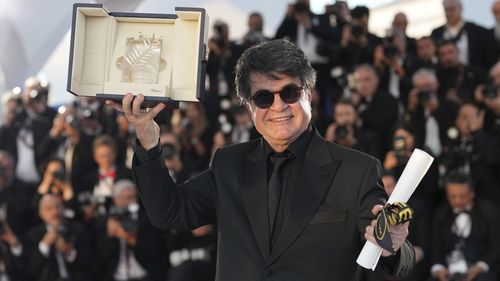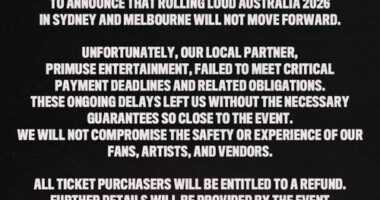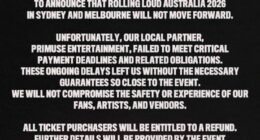Share this @internewscast.com
Iranian dissident filmmaker Jafar Panahi took home the Palme d’Or at the Cannes Film Festival on Saturday with his revenge thriller It Was Just an Accident. This achievement awarded the festival’s highest recognition to a director who has been prohibited from leaving Iran for more than 15 years.
Cate Blanchett presented the award to Panahi, who three years ago was imprisoned in Iran before going on a hunger strike.
For over a decade, Panahi has been creating films in secret within Iran, including a movie (This Is Not a Film) shot in his living room and another (Taxi) set inside a car.

The audience erupted in a thunderous standing ovation for the filmmaker, who was visibly stunned, raising his arms and leaning back in disbelief before joining in the applause with his collaborators and the surrounding crowd. On stage, Panahi received cheers from Cannes jury president Juliette Binoche, who in 2010 at Cannes had held up Panahi’s name to honor the filmmaker while he was under house arrest.
On stage, Panahi said what mattered most was freedom in his country.
“Let us join forces,” said Panahi.
“No one should dare tell us what kind of clothes we should wear, what we should do or what we should not do. The cinema is a society. Nobody is entitled to tell what we should or refrain from doing.”

The win for It Was Just an Accident extend an unprecedented streak: The indie distributor Neon has now backed the last six Palme d’Or winners. The latest triumph for Neon, which acquired It Was Just an Accident for North American distribution after its premiere in Cannes, follows its Palmes for Parasite, Titane, Triangle of Sadness, Anatomy of a Fall and Anora.
All those films were Oscar contenders and two, Parasite and Anora, won best picture.
Last year, filmmaker Mohammad Rasoulof fled Iran to attend the premiere of his film in Cannes, and resettle in Germany. Panahi, though, has said that unlike is friend Rasoulof, life in exile isn’t for him. He planned to fly home to Tehran on Sunday.
It Was Just an Accident was inspired by Panahi’s experience in prison. In the film, a group of former prisoners encounter the man who terrorised them in jail, and weigh whether or not to kill him.

Panahi was jailed in Tehran’s Evin Prison after going there to inquire about the then-jailed Rasoulof. Panahi was released in 2023 after going on a hunger strike.
In 2009, he was banned from from travelling out of Iran after attending the funeral of a student killed in the Green Movement protests. Through those years, Panahi continue to make films illegally in Iran, without permit, and having his films smuggled to festivals on USB drives. His travel ban was lifted after his release in 2023.
“The film springs from a feeling of resistance, survival, which is absolutely necessary today,” Binoche told reporters after the ceremony.
“Art will always win. What is human will always win.”

The Cannes closing ceremony followed a major power outage that struck south-eastern France on Saturday in what police suspected was arson. Only a few hours before stars began streaming down the red carpet, power was restored in Cannes.
“A day without electricity,” sighed John C Reilly, who sang an English-language “La Vie En Rose” at the ceremony. The festival’s films, he said, supplied “all the needed electricity.”
Other winners at the 2025 Cannes Film Festival
The Grand Prix, or second prize, was awarded to Joachim Trier’s Norwegian family drama Sentimental Value, his lauded follow-up to The Worst Person in the World. Some had expected Sentimental Value to win the Palme, but Trier â whose film reunites him with actor Renate Reinsve â still took a major prize.
“We live in a time of tremendous excess and saturation of images. Moving images are being thrown at us all the time,” said Trier.
“And I want to give homage to the Cannes Film Festival for being a place where the big cinematic image, which is the foundation of the moving image, the free image, the image that we take time to look at, the image where we can identify with each other in contemplation and empathy, to be cherished in this place in such a way is very important in this moment.”

Kleber Mendonça Filho’s Brazilian political thriller The Secret Agent won two big awards: best director for Filho and best actor for Wagner Moura. Though Cannes juries are generally urged to spread awards around, the two for The Secret Agent showed the jury’s strong feelings for it. Asked about the two prizes, juror Jeremy Strong explained, simply, “That was our wish.”
The wins, which followed the international film Oscar victory for Walter Salles’ I’m Still Here in March, gave Brazil more to celebrate. On X, Brazilian President Luiz Inácio Lula da Silva, said the awards “show that our country’s cinema is second to none”.
The jury prize was split between two films: Ãliver Laxe’s desert road trip Sirât and Mascha Schilinski’s German, generation-spanning drama Sound of Falling. Best actress went to Nadia Melliti for The Little Sister, Hafsia Herzi’s French coming-of-age drama.
The Belgian brothers Luc and Jean-Pierre Dardenne, who are two-time Palme d’Or winners, won best screenplay for their latest drama, Young Mothers. Its their ninth prize in Cannes. The festival’s award for best first film, the Camera d’Or, went to Hasan Hadi, for The President’s Cake, making it the first Iraqi film to win an award at the festival.

What else shaped Cannes this year
Saturday’s ceremony brings to a close a 78th Cannes Film Festival where geopolitics cast a long shadow, both on screen and off. Shortly before the French Riviera extravaganza, which is also the world’s largest movie market, US President Donald Trump floated the idea of a 100 per cent tariff on movies made overseas.
Most filmmakers responded with a shrug, calling the plan illogical. “Can you hold up the movie in customs? It doesn’t ship that way,” said Wes Anderson, who premiered his latest, The Phoenician Scheme at the festival. At the opening ceremony, honourary Palme d’Or recipient Robert De Niro called Trump “America’s philistine president.”
Other top American films in Cannes included Spike Lee’s Highest 2 Lowest (which pulled Lee away from his New York Knicks but not out of their blue and orange color), the Christopher McQuarrie-Tom Cruise actioner Mission: Impossible â Final Reckoning, and Ari Aster’s Eddington, which found a divisive reaction.

What Muhammad Ali was shouting in the most famous sports photo of all time
Panahi’s win put him in rare company. He’s now won Cannes’ Palme d’Or, Venice’s Golden Lion (for The Circle) and Berlin’s Golden Bear (for Taxi). Only three other filmmakers have done that: Henri-Georges Clouzot, Michelangelo Antonioni and Robert Altman.
Addressing reporters after his win, Panahi spoke about filmmakers and artists always being able to find a way, “even in complicated situations.”
“They must realise that no powers that be can halt such people in their tracks,” said Panahi.












